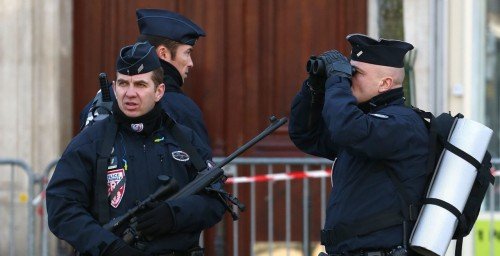
France has always been a top tourist destination for millions of travelers around the world. With its beautiful cities, rich history, and diverse culture, France attracts people from all walks of life. However, as with any major city or tourist destination, safety concerns arise. Luckily, there are several latest technologies and security agencies in France that can help keep you safe during your stay.
Surveillance Cameras
France is known for its sophisticated surveillance systems. There are over 300,000 surveillance cameras installed throughout the country, making it one of the most monitored countries in the world. These cameras are placed in public spaces such as airports, train stations, shopping malls, and other tourist areas to help keep an eye on any suspicious activity.
Surveillance cameras, also known as closed-circuit television (CCTV) cameras, are widely used in France to monitor public spaces and deter criminal activity. These cameras can be found in a variety of settings, including airports, train stations, streets, public transportation, shopping malls, and other public areas.
Surveillance cameras are an essential tool for law enforcement agencies to maintain public safety and security. They are used to detect criminal activity, identify suspects, and provide evidence for investigations. The footage captured by surveillance cameras can also be used to improve emergency response times, detect and prevent potential terrorist attacks, and monitor traffic flow.
However, the use of surveillance cameras in public spaces also raises concerns about privacy and civil liberties. Critics argue that constant surveillance can create a culture of fear and distrust, as well as infringe on individual privacy rights.
To address these concerns, French authorities have established strict regulations for the use of surveillance cameras. For example, the use of surveillance cameras in private spaces, such as bathrooms and changing rooms, is strictly prohibited. Authorities are also required to post signs informing the public that they are being monitored by CCTV cameras.
In conclusion, while the use of surveillance cameras in France has its benefits, it is important to balance public safety and security with individual privacy rights. With proper regulations in place, surveillance cameras can be a valuable tool for law enforcement agencies to maintain public safety and security.
Mobile Applications Several mobile applications are available in France that can help you stay safe. One such app is the "SAIP" (Système d’alerte et d’information des populations) app, which provides real-time information and alerts about any security risks or incidents. Another popular app is "STOP-COVID," which helps you track your exposure to COVID-19 and get tested if necessary.
Security Agencies
France has several security agencies, such as the National Police, the National Gendarmerie, and the General Directorate for Internal Security (DGSI), that work together to ensure public safety. These agencies are equipped with the latest technology and training to handle any situation that may arise.
Mobile applications, or apps, have become an increasingly popular way for individuals to stay informed and stay safe while traveling in France. Here are some examples of mobile apps that can help keep you safe:
-
SAIP (Système d’alerte et d’information des populations): This app provides real-time alerts and information about potential security risks or incidents, such as natural disasters, terrorist attacks, or public disturbances. The app also provides instructions on what to do in case of an emergency.
-
STOP-COVID: This app is designed to help track exposure to COVID-19 and provide information on testing centers and procedures. It also provides alerts if you have been in close contact with someone who has tested positive for COVID-19.
-
SafeStay: This app provides information and advice on safe travel in France, including recommendations on safe neighborhoods, public transportation, and emergency services.
-
SOS-urgence: This app provides information on emergency services, including ambulance, police, and fire department phone numbers. It also provides location services so that emergency services can locate you if needed.
-
Naviki: This app provides real-time updates on traffic conditions, including accidents and road closures. It can help you plan your route and avoid areas with heavy traffic.
These mobile apps can help you stay informed and prepared while traveling in France. However, it is important to note that not all apps are created equal. It is important to research the app before downloading it and make sure that it is reliable and trustworthy. Additionally, always exercise caution when using your mobile device in public spaces and be aware of your surroundings.
Emergency Services
In case of any emergency, you can dial the European emergency number "112" from anywhere in France. The emergency services are well-equipped to handle any situation, and they respond quickly to any call.
France has several security agencies that work together to maintain public safety and security. Here are some examples of the security agencies in France:
-
National Police (Police Nationale): The National Police is responsible for maintaining law and order in urban areas and enforcing French law. They also work closely with other law enforcement agencies to prevent and respond to criminal activity.
-
National Gendarmerie (Gendarmerie Nationale): The National Gendarmerie is responsible for maintaining law and order in rural areas and protecting public property. They also provide support to the National Police and other law enforcement agencies when needed.
-
General Directorate for Internal Security (DGSI): The DGSI is responsible for intelligence gathering and counterterrorism operations within France. They work closely with other law enforcement agencies to prevent and respond to terrorist threats.
-
Directorate-General for External Security (DGSE): The DGSE is responsible for intelligence gathering and counterterrorism operations outside of France. They work closely with foreign intelligence agencies to gather information and prevent terrorist attacks.
-
Municipal Police (Police Municipale): The Municipal Police is responsible for maintaining law and order in municipalities and enforcing local ordinances. They work closely with the National Police and other law enforcement agencies to prevent and respond to criminal activity.
These security agencies are well-trained and equipped with the latest technology to respond to any situation that may arise. They work together to maintain public safety and security and ensure that travelers can enjoy their stay in France with peace of mind.
Smart Locks and Security Systems
If you're staying in a hotel or Airbnb, you can use smart locks and security systems to keep your belongings safe. These systems use the latest technology to ensure that only authorized individuals can enter your room or apartment.
In conclusion, France has several latest technologies and security agencies in place to help keep you safe during your stay. By using these technologies and agencies, you can enjoy your trip to France without worrying about your safety.








